< Previous | Contents | Next >
![]()
![]()
Lap-Shoulder Belt
All seating positions in the vehicle have a lap-shoulder belt.
The following instructions explain how to wear a lap-shoulder belt
properly.
1. Adjust the seat, if the seat is adjustable, so you can sit up
straight. To see how, see “Seats”
in the Index.
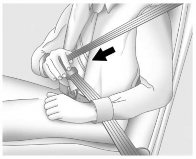
2. Pick up the latch plate and pull
the belt across you. Do not let it get twisted.
The lap-shoulder belt may lock if you pull the belt across you very quickly. If this happens, let the
belt go back slightly to unlock it.
Then pull the belt across you more slowly.
If the shoulder portion of a
passenger belt is pulled out all the way, the child restraint
locking feature may be engaged.
If this happens, let the belt go
back all the way and start again.
Engaging the child restraint locking feature in the front
outboard seating position may affect the passenger sensing
system. See Passenger Sensing System 0 91.
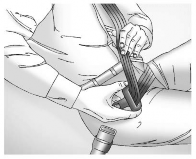
![]()
If the webbing locks in the latch plate before it reaches the
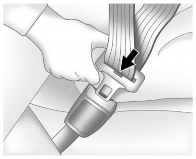
buckle, tilt the latch plate flat to unlock.
SEATS AND RESTRAINTS 81
![]()
3. Push the latch plate into the buckle until it clicks.
Pull up on the latch plate to
make sure it is secure. If the belt is not long enough, see Seat Belt Extender 0 83.
Position the release button on
the buckle so that the seat belt could be quickly unbuckled if
necessary.
4. If equipped with a shoulder belt height adjuster, move it to the
height that is right for you. See
“Shoulder Belt Height Adjuster”
later in this section for
instructions on use and
important safety information.
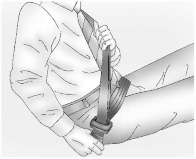
![]()
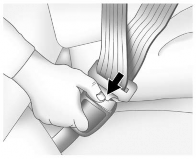
5. To make the lap part tight, pull up on the shoulder belt.
![]()
To unlatch the belt, push the button on the buckle. The belt should return to its stowed position.
Always stow the seat belt slowly. If the seat belt webbing returns quickly to
the stowed position, the retractor may lock and cannot be pulled out. If this
happens, pull the seat belt straight out firmly to unlock the webbing, and
then release it. If the webbing is still locked in the retractor, see your
dealer.
Before a door is closed, be sure the
seat belt is out of the way. If a door is slammed against a seat belt, damage can occur to both the seat belt and
the vehicle.
Shoulder Belt Height Adjuster
The vehicle has a shoulder belt height adjuster for the driver and front
outboard passenger seating positions.
Adjust the height so the shoulder
portion of the belt is on the shoulder and not falling off of it. The belt
should be close to, but not contacting, the neck. Improper shoulder belt
height adjustment could reduce the
82 SEATS AND RESTRAINTS
![]()
effectiveness of the seat belt in a crash. See How to Wear Seat Belts Properly 0 79.
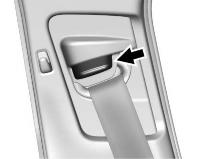
Press the release button and move the height adjuster to the desired position.
The adjuster can be moved up by
pushing the slide/trim up. After the
adjuster is set to the desired position, try to move it down without pushing
the release button to make sure it has locked into position.
Automatic Seat Belt Tightening System
The vehicle may have the Automatic Seat Belt Tightening System.
![]()
The system activates during
emergency braking and/or sudden
driving maneuvers and releases when driving conditions return to normal.
The system will not activate if the
Traction Control/Electronic Stability Control system is not functioning
properly. See Traction Control/
Electronic Stability Control 0 237. If there is a problem with the
Automatic Seat Belt Tightening
System, a message displays on the
Driver Information Center (DIC). If a system unavailable message displays repeatedly or a service message
displays, see your dealer. Other seat
belt functions are not affected by the Automatic Seat Belt Tightening
System.
Seat Belt Pretensioners
This vehicle has seat belt
pretensioners for front outboard
occupants. Although the seat belt
pretensioners cannot be seen, they are part of the seat belt assembly. They
can help tighten the seat belts during the early stages of a moderate to
severe frontal, near frontal, or rear
crash if the threshold conditions for
![]()
pretensioner activation are met. Seat belt pretensioners can also help
tighten the seat belts in a side crash or a rollover event.
Pretensioners work only once. If the pretensioners activate in a crash, the pretensioners and probably other
parts of the vehicle's seat belt system will need to be replaced. See Replacing Seat Belt System Parts after a Crash
0 84.
Do not sit on the outboard seat belt
while entering or exiting the vehicle or at any time while sitting in the seat.
Sitting on the seat belt can damage the webbing and hardware.
Rear Seat Belt Comfort Guides
Rear seat belt comfort guides may provide added seat belt comfort for older children who have outgrown booster seats and for some adults.
When installed on a shoulder belt, the comfort guide positions the belt away from the neck and head.
Comfort guides are available through your dealer for the rear outboard
seating positions. Instructions are included with the guide.